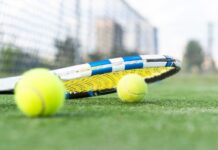This is a breaking news story and will be updated with more information as it becomes available.
UPDATE (MARCH 28, 1:00 p.m.) – All countable related athletic activities (CARA) have been cancelled for the remainder of the semester
The PSAC announced Friday that all countable related athletic activities have been suspended for the remainder of the academic year, after originally setting March 30 as a date for a potential reevaluation.
For the remainder of the semester, all sports will be allowed to participate in eight hours of virtual CARA. There will be no mandatory physical activities, and only athletic-related meetings may occur, with no more than two hours of film review.
Voluntary physical activities are permitted, and student-athletes are not required to report back to their coaches on such activities.
UPDATE (MARCH 13, 6:50 p.m.) – NCAA announces an additional season of eligibility to Division II spring sport student athletes
The NCAA approved actions in recruiting, reinstatement, legislation/interpretation, progress-toward-degree, playing and practice season and membership issues during its Friday, March 12 NCAA Division II Administrative Committee teleconference.
In the wake of the rapid spread of COVID-19, the NCAA was forced to hold a teleconference related to the regulations and policies impacted by the coronavirus.
Notably, the NCAA approved an extension request that will allow institutions to self-apply extension of eligibility and season of competition waivers for student-athletes whose 2019-20 spring seasons were cancelled, if the following criteria are met:
- The student-athlete used a season of competition in a spring sport during the 2019-20 academic year.
- The student-athlete was eligible for competition when he or she competed during the 2019-20 academic year.
- The student-athlete’s season was ultimately cancelled for reasons related to the COVID-19 outbreak.
So, if a student-athlete competed during the spring semester, was eligible to compete while competing and had their season cancelled by COVID-19, they will be eligible to compete next season.
The logistics behind the situation will become clearer as time unfolds. As of now, the process sounds simple but working unexpectedly returning scholarships into incoming rosters with new scholarships could raise additional questions.
Murray, in a post on his Twitter account, also raised the issue of the financial ability of student-athletes being able to return for another season.
The NCAA also approved a financial aid equivalency limit which will issue a blanket waiver to allow student-athletes who qualify for a self-applied season of competition waiver and/or extension of eligibility waiver to receive athletic aid for the 2020-21 academic year without counting toward the team’s equivalency limits.
A full-time enrollment action was approved, which will issue a blanket waiver for the spring 2020 term to permit student-athletes to participate in countable athletically related activities while enrolled less than full-time, provided the student-athletes were enrolled full-time in the for the spring 2020 term.
With financial and requirement actions approved by the NCAA, it paved the way for student-athletes to return for an extra season of eligibility, provided it makes sense for the individual athlete.
The NCAA also approved a recruiting dead period affecting all sports until April 15. Institutional staff members will be permitted to write or telephone a prospective student-athlete but cannot engage in in-person recruiting on- or off-campus.
The NCAA approved actions related to the reimbursement of costs associated with previously planned official and unofficial visits, extra benefits (i.e. meals, lodging and travel), progress toward degree requirements (e.g. term-by-term, academic year and annual academic credit hour requirements and GPA requirements), CARA restrictions for student-athletes who remain on campus, sports sponsorship, three-season requirements and items related to the NCAA Division II membership process.
UPDATED (MARCH 13, 10:15 a.m.) – PSAC announces athletic competition suspended through spring semester
The PSAC announced Friday morning that all athletic competition for the remainder of the spring semester has been suspended, effective immediately.
Murray tweeted Thursday night that the PSAC Board of Directors would be meeting via a conference call to discuss the future of athletic competition moving forward. The decision to suspend comes “in light of the latest news regarding COVID-19.”
Any non-conference competition in which travel has already taken place is left to institutional discretion through March 15, at which time all athletic competition must stop.
All countable related athletic activities are suspended until March 30 at which time the Board of Directors will review a proposal from Athletic Administrators to permit or suspend CARA for the remainder of the semester.
The decision to suspend all athletic events comes in the wake of athletic competition across the United States shutting down in the past couple of days.
UPDATED (MARCH 12, 2:35 p.m.) – THE NCAA has cancelled all winter and spring championships
NCAA President Mark Emmert and the Board of Governors have canceled the Division I men’s and women’s 2020 basketball tournaments, as well as all remaining winter and spring championships.
While the cancelation of March Madness will draw headlines, the Division II men’s and women’s basketball championships and all other Division II championships, including track & field and swimming, have also been cancelled, effective Thursday afternoon.
In the released statement, the NCAA cited the evolving COVID-19 public health threat, the ability to ensure events do not contribute to the spread of the pandemic and the impracticality of hosting such events at any time during this academic year given ongoing decisions made by other entities in making the decision.
—
In the wake of all 14 Pennsylvania State System of Higher Education institutions altering instructional plans for the remainder of the 2020 spring semester, all 18 member schools of the Pennsylvania State Athletic Conference have elected to continue competing, according to PSAC commissioner Steve Murray.
Murray said that during a conference call with each school’s athletic director and vice president Wednesday morning, every PSAC school confirmed the desire to continue with planned athletic competition—but that is subject to change with the release of more information.
During the conference call, Murray said he asked each school four questions in regard to the continuation of athletic competition: one about continuing to play, one about allowing athletes to compete in NCAA competition, one about fan attendance policies and one about whether non-championship teams were practicing.
Ultimately, Murray said the decision to continue competing falls to each individual school in the PSAC. If a school chooses to no longer compete in athletics, it has the ability to choose to withdraw from all athletic competition.
However, the decision to withdraw from competition would have to come directly from either the president of the university or its athletic director, according to Murray.
But as of 12 p.m. Wednesday, Murray said every school planned to continue competing in athletic competition.
With most members of the PSAC currently on spring break, Murray said teams would have through the weekend to gather more information as it becomes available.
Murray said that while the PSAC could realistically lose a week of competition and still catch up; anything beyond that would be tough to recover from.
In the case of individual athletes wishing to step away from the team, Murray said all 18 schools unanimously agreed to respect individual players’ wishes. Each school agreed to honor all scholarships and eligibility in the event a player would step away from the team, Murray said.
While the NCAA isn’t regulating much in regard to Division II athletics so far, it is limiting the attendance of Division II national tournaments.
Murray said the NCAA announced Wednesday at 4 p.m. that all Division II national tournament events would be run with very low spectator attendance, similar to the regulations set by the NCAA for the Division I men’s and women’s basketball tournaments.
Notably, in Division II men’s and women’s basketball, teams will be limited to a travel party of 20 people. Each of those 20 people will be allowed six passes to offer to friends and family for a grand total of 120 total people. This, when compiled between both teams for a total of 240 people, still sits below the Center for Disease Control’s magic number of 250 people.
With both the men’s and women’s Division II basketball tournaments slated to begin Thursday afternoon, the men’s side will feature Indiana University (Pa.), Shippensburg University and Mercyhurst University while the women’s side will feature Indiana, Gannon University and California University (Pa.).
Like in major college and professional sports around the world, the issue of the attendance of fans at athletic events has arisen in the PSAC—a trend which had been continued by the Golden State Warriors in the NBA before the league was suspended in a groundbreaking decision following Utah Jazz center Rudy Gobert testing positive for COVID-19 Wednesday night.
Murray said the decision to limit spectator attendance does not fall on either the NCAA or the PSAC—that decision falls to the individual schools in the PSAC.
“Every PSAC school will have the choice of whether to limit fan attendance,” Murray said.
While the threat of banning fans lingers around almost all athletic events, not just PSAC sports, Murray said the CDC has established a magic number of 250 people. Murray acknowledged that is hard to even get 250 people to PSAC athletic event as it is.
Of course, based on new government and NCAA rules and regulations in the days and weeks to come, fan attendance policies are subject to change.
In the case of Slippery Rock, SRU Director of Athletics Paul Lueken made it clear that the policy would be enacted in full.
”Spring sport athletic contests played at SRU will be played without spectators, fans or parents, until future notice,” Lueken said.
Slippery Rock athletic teams will continue to practice and compete as scheduled on the Rock Athletics website, Lueken said.
Non-PSAC games will be played if the opposing university is allowed to travel to the Slippery Rock campus, or if said university is able to host SRU. Non-conference games, however, are subject to change if further travel bans are enacted by Pennsylvania or neighboring states, Lueken said.
Non-championship season SRU athletic teams, which are out of season sports like football and men’s and women’s basketball, are not allowed to practice or compete during the extended spring break period since students will not be allowed back into the dorms until March 29.
Any changes regarding those regulations will be determined closer to March 29.
Rock Athletics, the Slippery Rock Athletic Communication website, said that coverage of baseball and lacrosse events may be changed due to the lack of undergraduate students required to run live streams.
Murray said that handshakes, fist bumps and physical displays of sportsmanship will be suspended, and an announcement will be made to the PSAC athletes about maintaining general hygiene.
With those in Division II athletics in constant communication, Murray said that such contact will continue. He said as of Wednesday night, all Division II schools expected to continue as planned.
But he acknowledged the uniqueness and uncertainty of the situation.








